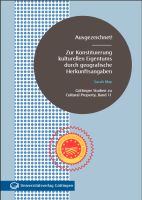Ausgezeichnet!
Zur Konstituierung kulturellen Eigentums durch geografische Herkunftsangaben
Author(s)
May, Sarah
Collection
AG UniversitätsverlageLanguage
GermanAbstract
Article descriptions such as “Allgäuer Emmentaler,” “Dresdner Christstollen” or “Bayerisches Bier” do not simply name culinary products, but locate them in certain regions and link them to memories and associations. They prove not only a spatial (geographic), but also a temporal (traditional) embedding in a certain region of origin. Such names are self-evidently attractive to clients, who have the choice between similar products, to producers, who are involved in international competition, and not least to politicians, who are interested in the protection and promotion of the economy in their areas of responsibility. Accordingly, the European Union (EU) established a legal instrument which regulates the use of geographical indications. It is based on the assumption that regions have common climatic, geological, biological and cultural characteristics.
Using the example of geographical indications and four exemplarily chosen specialties (the cheeses: Allgäuer Emmentaler, Odenwälder Frühstückskäse, Piave and Parmigiano Reggiano), Sarah May has developed an ethnographically thick, internationally comparative description of local and transnational practices in the system of EU quality schemes for agricultural products. She combines terms and theses of law and economics and translates them into an issue of cultural anthropology: She focuses on regional (culinary) culture and its economic valorization, on the interests, strategies and conflicts which accompany the transformation of regional handed-down practices and products into legally protected, spatially limited collective property.
Keywords
origin; indicator; culinary heritage; PDODOI
10.17875/gup2016-1005Publisher
Universitätsverlag GöttingenPublication date and place
2016Classification
Society and Social Sciences


 Download
Download